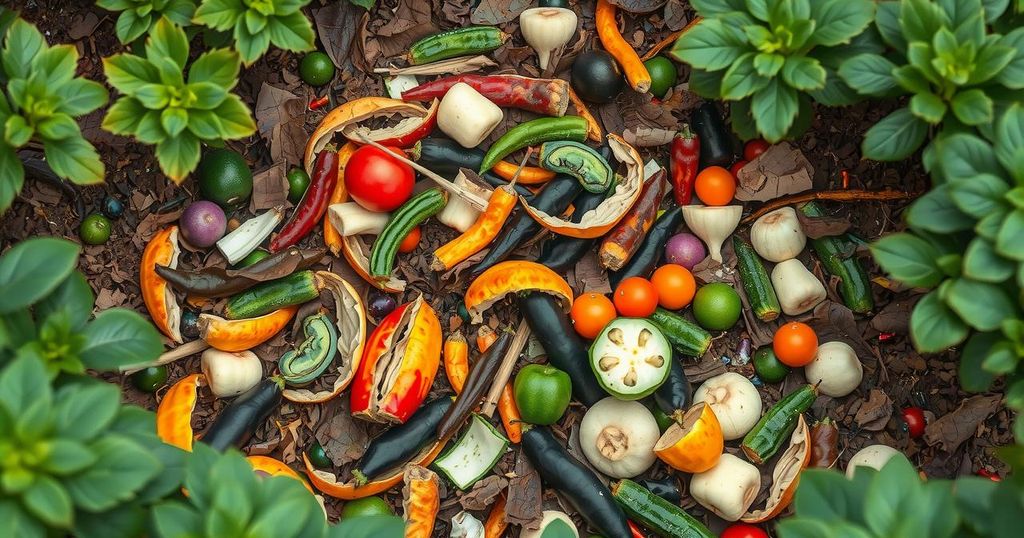Addressing Food Waste: Its Impact on Climate Change and Individual Action
Food waste is a major contributor to climate change, accounting for 8-10% of global greenhouse gas emissions and wasting significant resources like water and land. The article highlights the direct and indirect environmental impacts of food waste and suggests actionable steps individuals can take to reduce their waste footprint. By changing personal habits and advocating for broader reforms, meaningful progress can be made towards creating a sustainable food system.
Food waste is a significant yet often overlooked contributor to climate change, with around 40% of global food production discarded. This waste not only represents a considerable economic loss but also generates greenhouse gas emissions that are detrimental to our environment. By examining the causes and effects of food waste, individuals can adopt practical strategies to reduce their waste footprint, which holds promise for addressing both environmental and social issues.
Food waste accounts for approximately 8-10% of total greenhouse gas emissions, surpassing emissions from the aviation industry. Wasted food generates emissions throughout its lifecycle, including production and transportation. Decomposed food in landfills primarily releases methane, a potent greenhouse gas that exacerbates global warming. Therefore, every discarded item contributes not only to waste but also to increased pollution.
The environmental burden of food waste extends beyond emissions; it involves extensive resource wastage. Significant land equivalent to India, the United States, and Egypt is utilized for food that eventually goes uneaten. The water footprint of uneaten food is staggering, requiring an understanding of direct and indirect water use in food production. For example, producing a single hamburger can require approximately 660 gallons of water, highlighting the extensive resources wasted with each discarded meal.
Moreover, food waste incurs hidden environmental costs, such as the depletion of vital resources like topsoil and water reserves. Farming practices that promote excess production contribute to biodiversity loss, habitat destruction, and chemical runoff. The interconnections between food waste and biodiversity underscore the urgency of addressing these issues to preserve ecosystems and endangered species.
The long-term effects of food waste create a sustainability crisis in agriculture. Intensive farming reduces topsoil quality and affects aquifers, while increasing pest resistance necessitates stronger chemicals. Pollinator populations are also at risk, threatening the reproduction of essential food crops. This cycle exacerbates the challenges of future food production, signaling an impending agricultural crisis.
Moreover, food waste perpetuates a climate change feedback loop, as increased emissions lead to unpredictable growing conditions. These changes can result in crop failures and further food waste, aggravating the cycle of climate change. Conducting comprehensive strategies to combat food waste can help disrupt this cycle and mitigate climate impacts.
On a social level, food waste highlights a pressing contradiction in global food systems—while over 800 million people suffer from food insecurity, the United States alone generates 24.7 million tons of food waste annually. This injustice signifies an economic and moral imperative to address food waste effectively, ensuring that resources are equitably distributed.
Individuals can take tangible steps to reduce food waste in their daily lives. Key strategies include meal planning, proper food storage, embracing “ugly” produce, and understanding food labels. Crafting meals from leftovers and serving appropriate portion sizes can also minimize leftovers. Additionally, engaging in community food sharing and advocating for policy changes can amplify individual efforts and drive systemic reform in food waste management.
Ultimately, food waste represents an actionable environmental concern that individuals can tackle today. By transforming personal habits and advocating for broader change, it is possible to create a more sustainable food system that protects not only the environment but also human welfare. Therefore, collective efforts, no matter how small, contribute significantly to reducing food waste and its harmful impacts.
Food waste poses a significant challenge to both our environment and society. With up to 40% of food produced being wasted, this phenomenon not only drives greenhouse gas emissions but also leads to the depletion of essential resources and biodiversity. By taking individual action and advocating for systemic change, we can reduce food waste and combat climate change effectively. Implementing practical strategies in our everyday lives contributes to more sustainable living and addresses pressing issues of food insecurity and environmental degradation. It is crucial for individuals to engage in these efforts to foster a healthier planet for future generations.
Original Source: www.intelligentliving.co




Post Comment